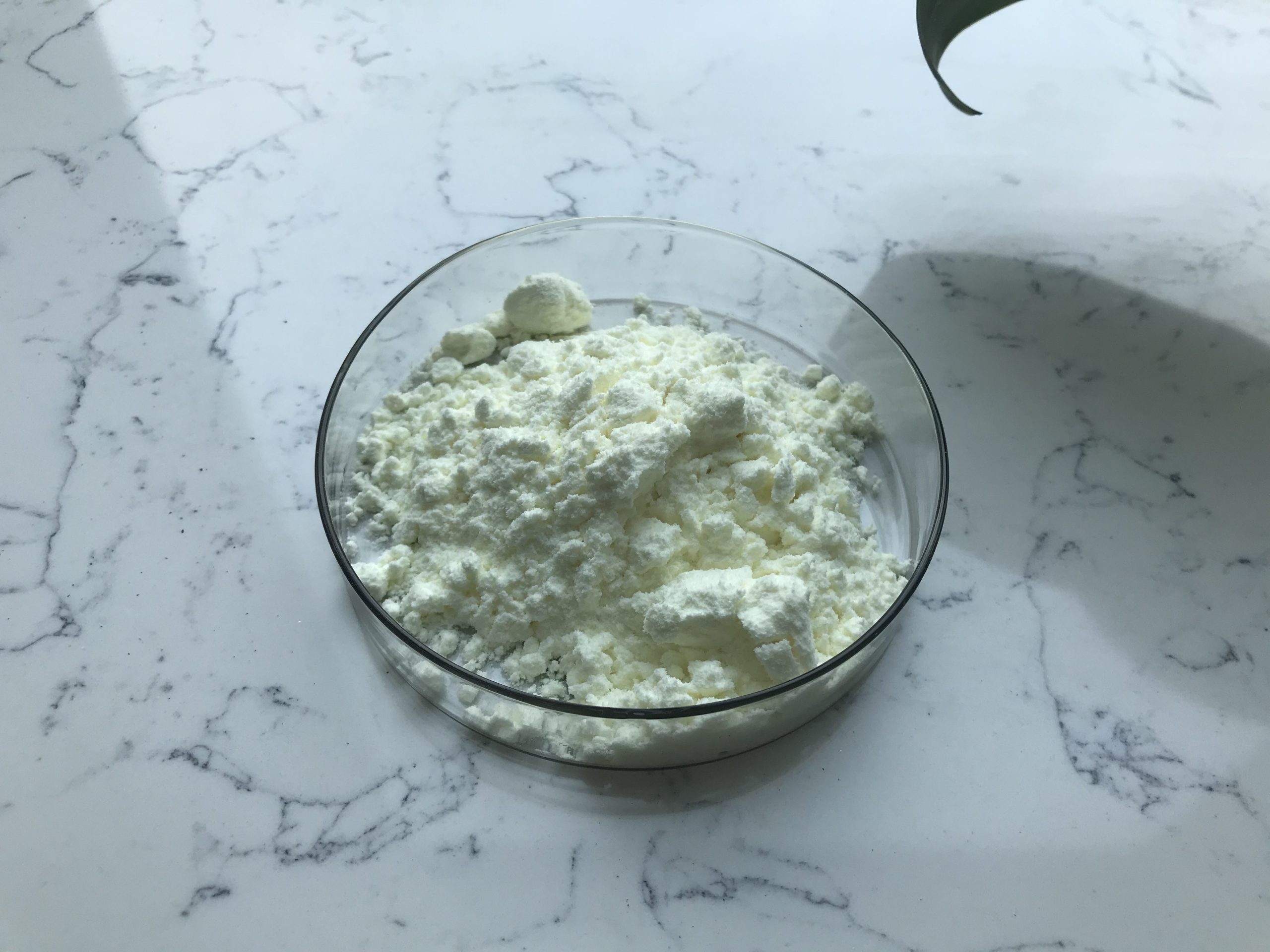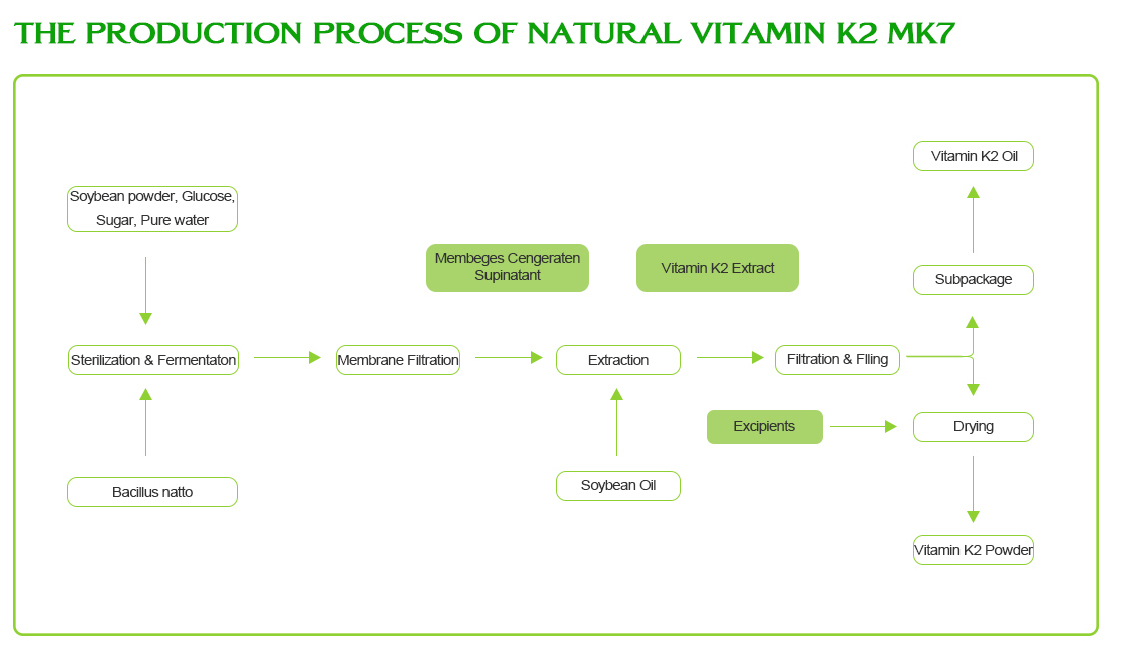Vitamin K2, also known as menaquinone, is a fat-soluble vitamin that plays a crucial role in various physiological functions in the body, primarily related to blood clotting and bone health. There are several forms of vitamin K2, with the two most common being MK-4 and MK-7.
Application of Vitamin K2
Blood Clotting: Vitamin K2 is essential for the synthesis of clotting factors in the liver. Without adequate vitamin K2, the body’s ability to form blood clots would be impaired, leading to increased bleeding and potentially severe bleeding disorders.
Bone Health: Vitamin K2 plays a role in bone metabolism by activating a protein called osteocalcin, which is necessary for the incorporation of calcium into bone tissue. This helps to maintain bone density and strength, reducing the risk of osteoporosis and fractures.
Cardiovascular Health: Some research suggests that Vitamin K2 may help prevent the buildup of calcium in the arteries, which is a risk factor for cardiovascular diseases. By directing calcium to the bones and teeth and away from the arteries, Vitamin K2 may support heart health.
Dental Health: Vitamin K2 is important for the development and maintenance of healthy teeth by assisting in the proper utilization of calcium.
Cancer Prevention: Emerging research suggests that adequate levels of Vitamin K2 may have a role in reducing the risk of certain cancers, including prostate cancer.
Skin Health: Vitamin K2 may play a role in maintaining healthy skin by promoting the removal of dead skin cells and assisting in wound healing.
Nervous System Function: While the exact role of Vitamin K2 in the nervous system is not fully understood, some studies suggest that it may have neuroprotective effects.
Immune System Support: Vitamin K2 may help support the immune system by promoting the activation of certain immune cells.

To ensure you’re getting enough Vitamin K2, you can include foods in your diet such as fermented dairy products (like cheese and yogurt), natto (a Japanese fermented soybean product high in K2), and leafy green vegetables. If you have a deficiency or specific health concerns related to Vitamin K2, consult with a healthcare professional or a registered dietitian for guidance on supplementation or dietary adjustments. It’s important to note that excessive Vitamin K2 intake can interfere with blood-thinning medications, so it’s essential to coordinate with your healthcare provider if you’re taking such medications.
Adverse Effects of Vitamin k2
Vitamin K2, also known as menaquinone, is a fat-soluble vitamin that plays a crucial role in bone health and blood clotting. It is generally considered safe when consumed at recommended levels through dietary sources. However, as with any nutrient or supplement, there can be adverse effects if consumed in excess or inappropriately. Here are some potential adverse effects of excessive vitamin K2 intake:
Blood Thinning: Excessive vitamin K2 intake can interfere with the effects of anticoagulant medications (blood thinners), such as warfarin. This can lead to decreased effectiveness of these drugs, increasing the risk of blood clots and other complications.
Gastrointestinal Distress: Some people may experience gastrointestinal symptoms like diarrhea or upset stomach if they consume high doses of vitamin K2 supplements.
Interactions with Medications: Vitamin K2 can interact with certain medications, including blood-thinning drugs as mentioned earlier. It’s important to consult with a healthcare professional if you are taking medications and considering vitamin K2 supplements to avoid potential interactions.
Allergic Reactions: In rare cases, people may experience allergic reactions to vitamin K2 supplements. This can include symptoms like rash, itching, swelling, or difficulty breathing. If you suspect an allergy, discontinue use and seek medical attention.
Risk of Overdose: Excessive intake of vitamin K2 over a prolonged period can lead to vitamin K toxicity. Symptoms of vitamin K toxicity can include jaundice, liver damage, and red blood cell breakdown (hemolysis). However, this is rare and usually only occurs with extremely high doses of synthetic vitamin K2.

It’s important to note that most people can obtain an adequate amount of vitamin K2 from a balanced diet that includes sources like fermented foods, cheese, and certain animal products. The recommended dietary allowances for vitamin K are established to prevent deficiency and related health issues. If you are considering vitamin K2 supplements, it’s crucial to consult with a healthcare provider to determine the appropriate dosage and to ensure it does not interact with any medications you are taking.
As with any dietary supplement, moderation and proper guidance are key to avoiding adverse effects. Always follow the recommended dosages and consult a healthcare professional if you have concerns about your vitamin K2 intake.
